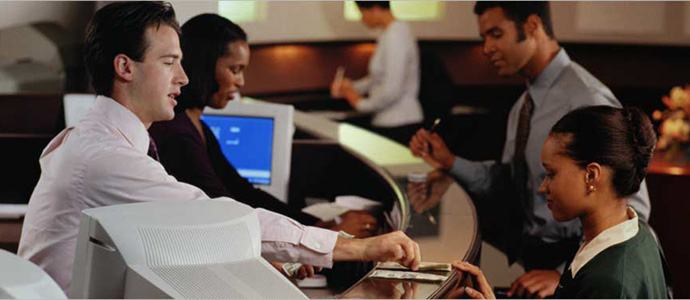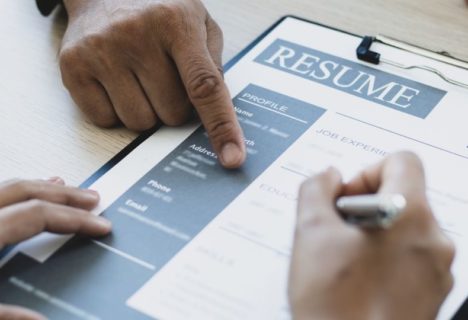When you walk out of prison with your $200 in gate money, opening a bank account for felons is not often a top priority. That first $200 will go quickly, but you need to be looking to the future. Aside from your gate money, you might be getting a check for any money stored in your trust account. You might get money from friends or relatives wanting to help you out.
You also might start working soon and receive income from an employer. Many employers no longer write checks or pay cash to their employees, they simply deposit the pay directly into the employee’s checking account. This is called direct deposit and has become very popular. You’ll need to have a bank account ready to go if you want to receive your hard-earned money.
Opening a bank account for felons
You will need a place to safely store this money while you begin your life outside of prison. This guide, created by our friends at the Prisoner Reentry Network, is intended to teach you the process for opening a bank account for felons, establishing a line of credit, and useing these valuable tools to better your life.
Overview of banks
Banks control money. For most people, banks track how much money each customer deposits, how that money is stored, and allows the customer to withdraw (take out) money. However, you also would go to bank if you needed a loan for a car or house. Banks make money by loaning money. Although banks do many things, their primary role is to take in funds — called deposits — from those with money, pool these funds, and lend them to those in need.
Banks work in the middle between depositors (who lend money to the bank) and borrowers (to whom the bank lends money). The amount banks pay for deposits and the income they receive on their loans are both called interest.
Banks and credit unions, discussed below, are the best way to handle your money and make it easy when opening a bank account for felons.
Overview of credit unions
In the United States, credit unions are not-for-profit organizations that exist to serve their members rather than to maximize profits. Like banks, credit unions accept deposits and make loans. But when you join a credit union, you become a member-owner instead of just a customer. Since credit unions have member-owners and not customers, they focus on providing a safe place to save and borrow at reasonable rates instead of focusing on making money for the bank itself. When opening a bank account for felons, a credit union is often a great choice over a bank.
Benefits of banks and credit unions
- Convenience: If you have a checking account, you can easily pay by check or through online bill pay. It’s also cheaper than buying a money order (and you’ll have proof of bank statements that you pay your bills). If you get a debit card for the account, you can withdraw money easily from Automated Teller Machines (ATMs) or make payments at stores. A debit card is usually accepted for purchases anywhere credit cards are accepted.
- Safety: Your money will be protected from theft and fires. Plus, your money will be federally insured. So if your bank or credit union closes, you will get your money back. The maximum amount of money that can be insured is $100,000.
- Easy to save money: Many banks offer an interest rate when you put your money in a savings account. The interest will help your money grow over time. Be sure to shop around and check what fees are involved as you don’t want to wind up paying more in fees than you are gaining in interest.? If you have a checking and savings account with the same institution, you can have your money transferred periodically from checking to savings, thereby putting the money aside to help grow your savings.
- Bank accounts for felons are cheaper: Banks and credit unions generally offer their account holders free or low-cost services:
- Cashing checks: Using a check cashing outlet really adds up. You can deposit and cash your checks at the institution where you have a bank account for free.
- Paying bills: Without a bank account for felons, you probably rely on check cashing outlets, telephone bill pay, or money orders — all of which have attached fees — to pay your bills. With a checking account, you can write checks for free or pay online at a low cost.
- Transferring/wiring money: If you use a money transfer company to wire money to another person’s account, you will pay a fee. This is usually a percentage of the amount of the transfer. Depending on the amount you want to transfer, this fee can be expensive. If you wire from your bank account to another person’s account, your bank will usually charge a flat rate that is generally lower than the money transfer company.
- Accessing cash: When you need cash but don’t have a bank account, you may decide to use a credit card to get a cash advance from an ATM. The credit card company will charge you a transaction fee and interest. If you have a bank account and an ATM or debit card, you can access your money from your own bank’s ATM for free. Although you can access your money from any ATM, you will likely pay a transaction fee if you use an ATM from a provider other than your own bank.
- Bank accounts for felons can help you access credit: Banks and credit unions can help you access credit to acquire a home, a car, or student or personal loans, because banks tend to favor existing customers, particularly those who manage their money well. Plus, going to small loan lenders that lend you cash quickly can be quite expensive because they charge lending fees and high interest rates. ?While bank accounts for felons are preferred over check cashers and piggy banks, banks will also have fees that you should be aware of. For example, banks will charge you if you use your debit card on an ATM that is not theirs. Also, depending on the type of account you have, you must maintain a minimum balance of a certain amount to avoid being charged. It’s always best to shop around for the best product that fits your needs.
Benefits of credit unions over banks
- Better Service: Credit unions serve members of modest means. Low-income credit unions provide financial services at reasonable rates in areas that are often underserved by banks. This makes it easier when opening a bank account for felons in underserved areas.
- Favorable Rates: Fees and loan rates at credit unions are generally lower, while interest rates returned are generally higher, than banks and other for-profit institutions.
- Customer Service: Credit unions are democratically operated by members, allowing account holders an equal say in how the credit union is operated, regardless of how much they have invested.
Overview of check cashing businesses
Check cashing businesses, which are common in low-income neighborhoods, make you pay for your money. They are usually the same businesses that offer payday loans. If you are able to budget your spending, the only benefit of managing your money through a check cashing ?business is that they are open 24/7. ? ?Banks will cash checks for free if you have an account, and check cashing businesses will charge you up to $20 for every $1,000 cash provided.
Although check cashing businesses cost money up front, they are often the only option for people without a bank account. Evaluate the costs and benefits of cashing a check at one of these businesses — does the cost of immediately receiving the cash outweigh the price (in money and time) of getting a bank account for felons? ?Some check cashing businesses do not cost as much. For example, WalMart charges only $4 to cash a check up to $1,000. Evaluate your own situation, and determine whether you should assume the upfront costs of cashing a check through this type of business. ?Check cashing businesses should only be used as a last resort, if do not have the capability of opening a bank account for felons at a bank or credit union.
Overview of payday loans
Check cashing businesses also generally provide payday loans, which are short-term, high interest loans. The costs of receiving money through these services is extremely high. We can’t stress enough that payday loans are almost always a bad idea! The interest rate on these loans is often 100 times higher than a loan from a bank. It is very easy to get stuck with payday loans you can’t pay off and in a position where you are paying huge amounts of interest for what started off as a small loan.
Evaluate the costs of receiving this money immediately against delaying whatever payment you intend to use it for. If there is any possible way to avoid getting a payday loan, you should.
Opening a bank account for felons
The procedure for opening a bank account for felons and one at a credit union are the same. It’s best if you appear in person to open a bank account for felons so you can be guided to an account that is appropriate for your needs.
Requirements
The minimum information a bank must obtain when opening a new bank account for felons typically includes:
- Name
- Date of Birth
- Address
- Social Security Number
- Two forms of identification:
- Primary identification which can include:
- Driver’s license
- State issued ID card
- Passport
- Foreign issued ID
- Secondary identification which can include:
- Major or local debit/credit card embossed with name (does not include gift cards)
- College ID of institution where applicant is currently enrolled
- Utility bill bearing name/address used for opening account
- Rental/lease contract for current residence
- Documentation of home ownership for current residence
- Current state-issued learner’s permit
- Permanent resident card
- Certificate of citizenship or naturalization
- Immigration form I-571
- Certified copy of court order: Must contain full name and date of birth. Examples include: Adoption document or a name change document
- Employment authorization card (with photograph) issued by a U.S. federal government agency
- Primary identification which can include:
Some banks require more information. Before going in to open an account for felons, you should check the bank’s requirements on their website or call them.
Types of bank accounts for felons
There are many types of bank accounts for felons, and banks will work with you to determine which is appropriate for you. Ask yourself what you will be using your account for. Will you be making purchases online? Paying bills? Or do you just want to accrue interest?
Checking bank accounts for felons
These are the most common types of bank accounts for felons. They allow you to store your money at the bank and remove it in a few ways. All checking bank accounts for felons allow you to write paper checks, and most will provide you with about 200 checks for free.
Most checking accounts for felons give you a “check card” or “debit card.” This is similar to a credit card, but does not allow you to spend more than you have in your account without incurring a fee. When you spend money on a debit card, you spend it directly from your account.
Most checking accounts also allow you to pay bills over the internet, directly from your account, and these accounts will also let you view your balance — the amount of money in your account —over the internet.
Savings bank accounts for felons
A savings account allows you to accumulate interest on funds you’ve saved for future needs. Interest rates can be compounded on a daily, weekly, monthly, or annual basis. Savings accounts vary in their monthly service fees, interest rates, method used to calculate interest, and minimum opening deposit. Understanding the account’s terms and benefits will allow for a more informed decision on the account best suited for your needs.
Individual retirement accounts (IRAs)
IRAs, or individual retirement accounts, allow you to save independently for your retirement. These plans are useful if your employer doesn’t offer retirement benefits or you want to save more than your employer-sponsored plan allows. These accounts come in two types: the traditional IRA and Roth IRA.
The Roth IRA is popular because the funds can be withdrawn tax-free in many situations. Others prefer traditional IRAs because these contributions are tax-deductible. Both accounts have contribution limits and other requirements you may need to discuss with your tax advisor before choosing your account.
You will likely need a checking account, but discuss your needs with the bank clerk when you are signing up for an account.




